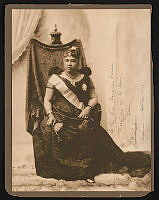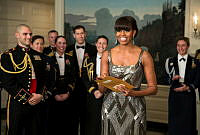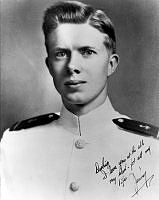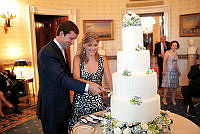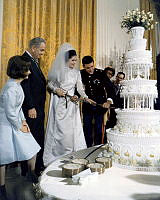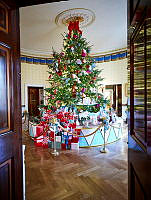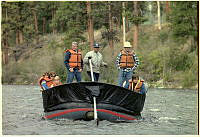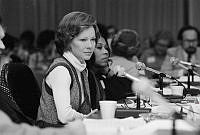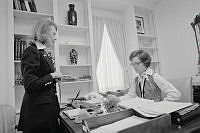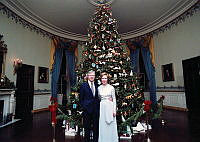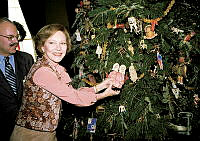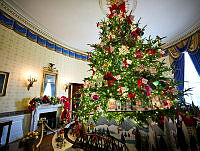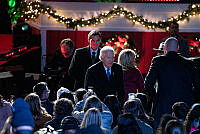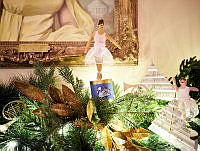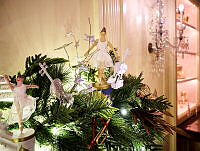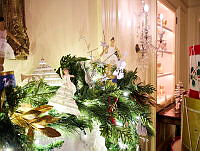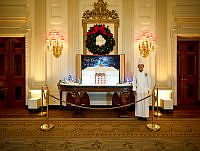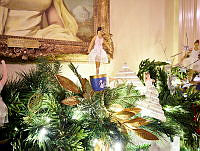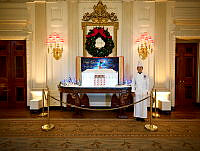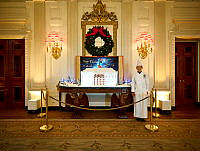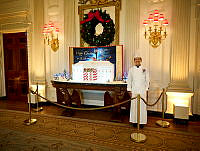Rubenstein Center Scholarship
Alice Roosevelt Longworth: Presidential Daughter and American Celebrity
Alice Lee Roosevelt’s life changed forever on September 14, 1901, when President William McKinley succumbed to his wounds eight days after being shot by an assassin. Vice President Theodore Roosevelt was quickly sworn in as the President of the United States. The Roosevelt family moved into the White House and the nation was introduced to one of the most sensational first children in United States history, Alice Roosevelt. The spirited and sometimes unruly first daughter was a headline-maker, risk-taker, rabble-rouser, and trendsetter during her years in the White House. By the end of her time living in the White House, Alice Roosevelt had become one of the most famous celebrities of the early twentieth century.
Alice made quite an entrance into Washington life. On January 3, 1902 the Roosevelt White House hosted Alice’s debutante ball as one of its first large social events. It was typical for daughters of high society to be presented as eligible for marriage in these types of gatherings. However, most young ladies did not have the benefit of holding their ceremonies at the White House. It was a chance for Alice to shine on her own, strategically scheduling the event close to the Christmas holiday so that eligible young men could attend without interrupting their studies. The ball was held in the East Room of the White House with some six hundred people in attendance. Alice danced to music of the United States Marine Band with many men of high society, including her distant cousin, nineteen-year-old Franklin Delano Roosevelt.1
Touted as an event not seen “since the days of Dolly Madison,” Alice’s debutante ball helped launch a lifelong relationship with the press.2 The press nicknamed her “Princess Alice” and her celebrity status was born. Daily articles featuring Alice covered the entirety of her life: from the extraordinary, with flashy headlines like “Longworth’s Fight Fire: Daughter of President Personally Rescues Pet Driving Horse,” to the ordinary, with, “Social and Personal: Miss Alice Roosevelt Visiting Relatives at Farmington.”3

Alice Roosevelt holding a parasol.
Library of CongressHer popularity in the press made Alice Roosevelt a household name, and significantly influenced the culture of the early twentieth century. As her fame grew so did a market of Alice-inspired goods. The color “Alice Blue” was named for the grey-blue color of her eyes and became a popular shade for dresses and other garments. Her picture was featured on a number of postcards, which were collected and circulated by her fans. The young celebrity also inspired several songs including “The Alice Roosevelt March,” and “Alice Roosevelt Waltz.”4
Despite her prominence in the press, Alice resisted conforming to society’s standards for young ladies. She occasionally took part in her younger siblings’ antics, as they wreaked havoc on the White House, sliding down stairways and moving through hallways on stilts.5 To the delight (and horror) of some White House visitors, Alice frequently carried a small snake in her purse named Emily Spinach.6 She also began smoking cigarettes, which enthralled some readers while appalling others. Some believed it was a presidential scandal in the making. When her father told her that no daughter of his would smoke under his roof, Alice climbed to the top of the White House to smoke above it.7 At a 1909 school convention, a Los Angeles school superintendent even suggested that Alice Roosevelt was responsible for spreading a smoking habit to the nation, which had a “demoralizing effect on the women of this country.”8

Alice Roosevelt stands next to her husband, Nicholas Longworth (left) and her father, President Theodore Roosevelt (right), on February 17, 1906, the day of their wedding at the White House.
Library of CongressAlice was certainly a magnet for scandal due to her sharp commentary and rebellious actions. However, Theodore Roosevelt soon learned that he could leverage the authority of his office to keep his popular daughter out of mischief. He began to call upon his daughter to act as White House Hostess for formal occasions and came to value her potential as a worthy substitution if he were unable to attend an event. Roosevelt also began sending Alice on trips to places like the Caribbean. After her successful 1903 trip to Puerto Rico, her father wrote, “You were of real service down there...and your presence was accepted as a great compliment.”9
By 1905, Alice had proved so successful in performing official duties that her father sent her with a large peace delegation to Asia as he concluded peace discussions after the Russo-Japanese War. Many other delegates accompanied Alice, including Secretary of War William Howard Taft and her friend and love interest, Ohio Representative Nicholas Longworth. The delegation traveled to Japan, China, Korea, and the Philippines where they met with many officials and attended numerous events. Alice was treated like royalty and showered with so many gifts that her friend, Willard D. Straight, called her “Alice in Plunderland.”10 The American press praised the first daughter and the trip turned out to be a success in more ways than one.
The journey concluded with Alice’s private agreement to marry Congressman Longworth. After weeks of speculation, the engagement was officially announced on December 13, 1905 and people from around the country sent Alice gifts and notes of congratulation. Alice was pleased by the press coverage and documented all of the news articles about her engagement in a large scrapbook. She included clippings on rumors, congratulations, reports about the wedding preparations, and excerpts about her future husband’s congressional activities. By the time she married Nicholas on February 17, 1906, her wedding had dominated the news cycle.11

Alice poses with a parrot circa 1904.
Library of CongressThe wedding took place in the renovated East Room of the White House. At around eleven o’clock in the morning, foreign dignitaries, Supreme Court justices, members of Congress, and distinguished guests filed into the East Room. Theodore Roosevelt gave his daughter away and the couple was married by Washington’s Episcopal Bishop, Henry Yates Satterlee, in a noon ceremony. Afterwards the Longworths held a wedding breakfast where, in true Alice fashion, she cut the wedding cake with the sword of a military aide.12
Upon the conclusion of the wedding Alice was no longer a child of the White House. Following their honeymoon trip to Cuba, the Longworths returned to Washington and set up their home and life together. However, Alice’s marriage was by no means the end of her days in the spotlight. For the remaining years of her father’s term, Alice continued to be featured in the press. In fact, long after the conclusion of Theodore Roosevelt’s presidency she remained a popular attraction as she regularly maintained a reputation for her sharp wit and scandalous behavior. In her later years she continued to be a favorite guest at the White House, meeting with Presidents John F. Kennedy and Richard Nixon. Whether she was participating in politics, changing definitions of proper behaviors for women, or making headlines for her impersonation of Eleanor Roosevelt, Alice remained a fascinating fixture in Washington social circles. One thing is for certain, by the end of her ninety-six years she had earned her title as “the other Washington Monument.”13

Alice Roosevelt poses in the White House Conservatory prior to its 1902 demolition.
Library of Congress












